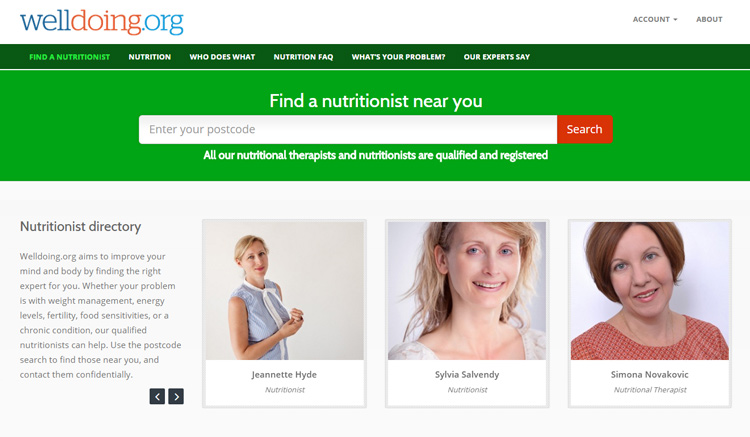
Find a Nutrition Expert Through Welldoing.org
Many people have problems with food. They suffer digestive upsets, their weight yo-yos up and down in an alarming way, they get stuffed noses or skin conditions if they eat the wrong things. Sometimes changes in their situation – such as pregnancy or illness – can trigger completely different reactions to what they have usually been able to eat or drink.
We’re not talking about eating disorders here (our therapist directory is a critical connection with experts in this area). We are talking about the scientific study of how food affects us. Optimum nutrition – an adequate, well-balanced diet combined with regular physical activity – is a cornerstone of good health. Poor nutrition can lead to reduced immunity, increased susceptibility to disease, impaired physical and mental development, and reduced productivity. As a result nutrition is important for all of us.
Modern science is moving away from a one size fits all approach and propelling us towards personalised nutrition
Visiting your doctor may provide little in the way of help with problems surrounding food. Science is moving fast, and most GPs would struggle to keep up. As nutritional therapist Jeannette Hyde wrote on our site recently: “Modern science is moving away from a one size fits all approach and propelling us towards personalised nutrition. This is where the types and amounts of food we eat, are better determined by our individual makeup and lifestyle, than by a diet designed for an average person who doesn't actually exist. The type of foods that might help one person thrive, can activate genes connected with disease in others”. Read the rest of her post here.
Many of our contributors, such as Rachel Kelly and Bea Mitchell, have written about how what they eat and drink have affected their moods. But we wanted to go further and provide evidence-based and expert information and advice about nutrition itself.
That is why we have now added a directory of qualified, registered nutritionists and nutritional therapists to our site, searchable by postcode. Their profiles highlight the areas in which they are most expert, and also outline their training, qualifications, and details of their practice.
We will be building up this area over the next few months, with contributions from our members and others who work in the nutrition and wellbeing area.
In the meantime, take a look at the directory, and don’t miss the other information in the nutrition area, including the difference between various experts, and what health problems they can help support.










